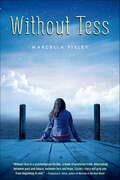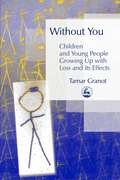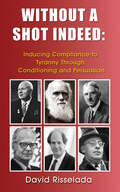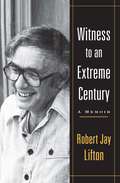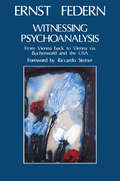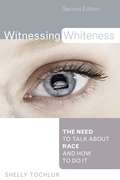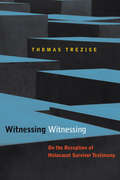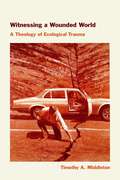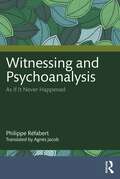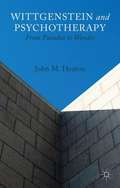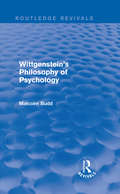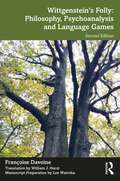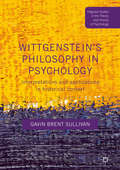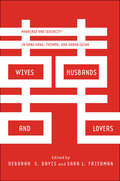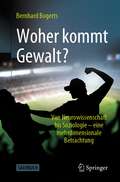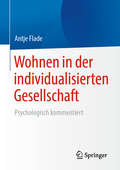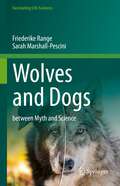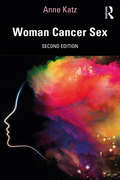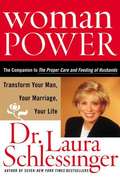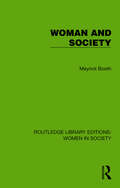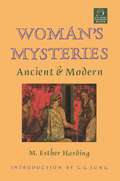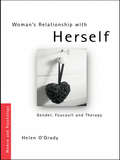- Table View
- List View
Without Hesitation: Speaking to the Silence and the Science of Stuttering
by Gerald A. Maguire Lisa Gordon WitherBack Cover: “What is stuttering? Five million voices can speak to this. A disorder that has defied physicians for centuries, stuttering claims as its own grade-school students and senior citizens, captains of industry and kings of nations, politicians, performers and professional athletes. It causes confusion in families, contempt in the uninformed and anguish in the approximately five million individuals in the United States who find it impossible to speak without effort. There are no cures but there are solutions. And there is hope because of significant advancements in pharmacotherapy--the clinical treatment of stuttering with medication. Without Hesitation: Speaking to the Silence and the Science of Stuttering explores the history, the heartache and the hope for this medical condition from an insider's perspective: a physician who has stuttered since childhood and knows how it feels to struggle with words and to express himself with ease.”
Without Tess
by Marcella PixleyTess and Lizzie are sisters, sisters as close as can be, who share a secret world filled with selkies, flying horses, and a girl who can transform into a wolf in the middle of the night. But when Lizzie is ready to grow up, Tess clings to their fantasies. As Tess sinks deeper and deeper into her delusions, she decides that she can't live in the real world any longer and leaves Lizzie and her family forever. Now, years later, Lizzie is in high school and struggling to understand what happened to her sister. With the help of a school psychologist and Tess's battered journal, Lizzie searches for a way to finally let Tess go.
Without You – Children and Young People Growing Up with Loss and its Effects
by Tamar GranotAdults often believe that children are quick to overcome and forget loss, but there is evidence that children are affected by the memory and impact of loss throughout their lives, and especially during the years that they grow-up.In this sympathetic book, Tamar Granot explains the immediate and long-term effects of loss on children and adolescents. She describes how loss is experienced at different ages, explains the significant consequences it can have at each stage of the children's development and the effects it might have on the development of their personality. The author describes how the circumstances of the loss and its aftermath and the behavior of parents and other significant caregivers influence the child's reaction. She explores the special effects of different kinds of loss, including the suicide of a parent or sibling, murder, the loss of a parent through death and parental abandonment due to divorce, disease, substance abuse, etc. Tamar Granot emphasizes how important it is to stay attuned to the special needs of these children along their growing years and provides practical and sensitive explanations and advice on how best to support them. Adults who experienced loss in childhood will find the book insightful to retrospective understanding of the effects of the loss on their growth and adult life, especially on their emotional state and their functioning in intimate relationships and as parents. Drawing on theories of loss and child development in an accessible way, Without You provides valuable guidance for parents and carers of bereaved children, as well as for the professionals who support them.
Without a Shot Indeed: Inducing Compliance to Tyranny Through Conditioning and Persuasion
by David RisseladaNikita Khrushchev proudly proclaimed the United States would one day awaken as a full-blown communist country. Americans are gullible, he said, the United States will be defeated without firing a shot. What did he mean by this? This book will attempt to answer this question by examining the social sciences used to study our behavior for the purpose of manipulating and changing it. The theories of B.F. Skinner, Cass Sunstein and others will be looked at along with scientific models from which our behavior is examined. Persuasive communication strategies designed to gain compliance will also be explored along with what is understood about the human reaction to fear. Without a Shot Indeed: Inducing Compliance to Tyranny will expose the reader to the reality that our behaviors, beliefs and attitudes are constantly under the microscope and the target of those seeking to change our nation.
Witness to an Extreme Century
by Robert Jay LiftonOn a fateful day in the spring of 1954 Robert Jay Lifton, a young American psychiatrist just discharged from service in the Korean War, decided to stay in Hong Kong rather than return home--changing his life plans entirely--so that he could continue work that had enthralled him, interviewing people subjected to Chinese thought reform. He had plunged into uncharted territory in probing the far reaches of the human psyche, as he would repeatedly in the years ahead, and his Hong Kong research provided the first understanding of the insidious process that came to be known as brainwashing. From that day in Hong Kong forward, Lifton has probed into some of the darkest episodes of human history, bearing his unique form of psychological witness to the sources and consequences of collective violence and trauma, as well as to our astonishing capacity for resilience. In this long-awaited memoir, Lifton charts the adventurous and constantly surprising course of his fascinating life journey, a journey that took him from what a friend of his called a "Jewish Huck Finn childhood" in Brooklyn to friendships with many of the most influential intellectuals, writers, and artists of our time--from Erik Erikson, David Riesman, and Margaret Mead, to Howard Zinn and Kurt Vonnegut, Stanley Kunitz, Kenzaburo Oe, and Norman Mailer. In his remarkable study of Hiroshima survivors, he explored the human consequences of nuclear weapons, and then went on to uncover dangerous forms of attraction to their power in the spiritual disease he calls nuclearism. During riveting face-to-face interviews with Nazi doctors, he illuminated the reversal of healing and killing in ordinary physicians who had been socialized to Nazi evil. With Vietnam veterans he helped create unprecedented "rap groups" in which much was revealed about what we now call post-traumatic stress disorder, helping veterans draw upon their experience for valuable, even prophetic, insights about atrocity and war. As a pioneer in psychohistory, Lifton's encounters with the consequences of cruelty and destructiveness led him to become a passionate social activist, lending a powerful voice of conscience to the suppressed truths of the Vietnam War and the dangers of nuclear weapons. Written with the warmth of spirit--along with the humor and sense of absurdity--that have made Lifton a beloved friend and teacher to so many, Witness to an Extreme Century is a moving and deeply thought-provoking story of one man's extraordinary commitment to looking into the abyss of evil in order to help us move beyond it.
Witness to an Extreme Century: A Memoir
by Robert Jay LiftonOn a fateful day in the spring of 1954 Robert Jay Lifton, a young American psychiatrist just discharged from service in the Korean War, decided to stay in Hong Kong rather than return home--changing his life plans entirely--so that he could continue work that had enthralled him, interviewing people subjected to Chinese thought reform. He had plunged into uncharted territory in probing the far reaches of the human psyche, as he would repeatedly in the years ahead, and his Hong Kong research provided the first understanding of the insidious process that came to be known as brainwashing. From that day in Hong Kong forward, Lifton has probed into some of the darkest episodes of human history, bearing his unique form of psychological witness to the sources and consequences of collective violence and trauma, as well as to our astonishing capacity for resilience. In this long-awaited memoir, Lifton charts the adventurous and constantly surprising course of his fascinating life journey, a journey that took him from what a friend of his called a "Jewish Huck Finn childhood" in Brooklyn to friendships with many of the most influential intellectuals, writers, and artists of our time--from Erik Erikson, David Riesman, and Margaret Mead, to Howard Zinn and Kurt Vonnegut, Stanley Kunitz, Kenzaburo Oe, and Norman Mailer. In his remarkable study of Hiroshima survivors, he explored the human consequences of nuclear weapons, and then went on to uncover dangerous forms of attraction to their power in the spiritual disease he calls nuclearism. During riveting face-to-face interviews with Nazi doctors, he illuminated the reversal of healing and killing in ordinary physicians who had been socialized to Nazi evil. With Vietnam veterans he helped create unprecedented "rap groups" in which much was revealed about what we now call post-traumatic stress disorder, helping veterans draw upon their experience for valuable, even prophetic, insights about atrocity and war. As a pioneer in psychohistory, Lifton's encounters with the consequences of cruelty and destructiveness led him to become a passionate social activist, lending a powerful voice of conscience to the suppressed truths of the Vietnam War and the dangers of nuclear weapons. Written with the warmth of spirit--along with the humor and sense of absurdity--that have made Lifton a beloved friend and teacher to so many, Witness to an Extreme Century is a moving and deeply thought-provoking story of one man's extraordinary commitment to looking into the abyss of evil in order to help us move beyond it.
Witnessing Psychoanalysis: From Vienna back to Vienna via Buchenwald and the USA
by Ernst FedernThis book contains a collection of articles on social psychology, the psychology of terror and violence, psychoanalytic psychotherapy, and the history of psychoanalysis. It also includes Federn's moving memoir of his encounter with Bruno Bettelheim in Buchenwald.
Witnessing Whiteness: The Need to Talk About Race and How to Do It (Second Edition)
by Shelly TochlukWitnessing Whiteness invites readers to consider what it means to be white, describes and critiques strategies used to avoid race issues, and identifies the detrimental effect of avoiding race on cross-race collaborations. The author illustrates how racial discomfort leads white people toward poor relationships with people of color. Questioning the implications our history has for personal lives and social institutions, the book considers political, economic, socio-cultural, and legal histories that shaped the meanings associated with whiteness. Drawing on dialogue with well-known figures within education, race, and multicultural work, the book offers intimate, personal stories of cross-race friendships that address both how a deep understanding of whiteness supports cross-race collaboration and the long-term nature of the work of excising racism from the deep psyche. Concluding chapters offer practical information on building knowledge, skills, capacities, and communities that support anti-racism practices, a hopeful look at our collective future, and a discussion of how to create a culture of witnesses who support allies for social and racial justice.
Witnessing Witnessing: On the Reception of Holocaust Survivor Testimony
by Thomas TreziseWitnessing Witnessing focuses critical attention on those who receive the testimony of Holocaust survivors. Questioning the notion that traumatic experience is intrinsically unspeakable and that the Holocaust thus lies in a quasi-sacred realm beyond history, the book asks whether much current theory does not have the effect of silencing the voices of real historical victims. It thereby challenges widely accepted theoretical views about the representation of trauma in general and the Holocaust in particular as set forth by Giorgio Agamben, Cathy Caruth, Berel Lang, and Dori Laub. It also reconsiders, in the work of Theodor Adorno and Emmanuel Levinas, reflections on ethics and aesthetics after Auschwitz as these pertain to the reception of testimony.Referring at length to videotaped testimony and to texts by Charlotte Delbo, Primo Levi, and Jorge Semprun, the book aims to make these voices heard. In doing so, it clarifies the problems that anyone receiving testimony may encounter and emphasizes the degree to which listening to survivors depends on listening to ourselves and to one another.Witnessing Witnessing seeks to show how, in the situation of address in which Holocaust survivors call upon us, we discover our own tacit assumptions about the nature of community and the very manner in which we practice it.
Witnessing a Wounded World: A Theology of Ecological Trauma
by Timothy MiddletonA crucial intervention at the intersection of ecotheology and trauma theology We are in the midst of a global ecological crisis. At times, the scale of the suffering involved can be hard to fully comprehend. The whole planetary ecosystem feels out of kilter. Meanwhile, trauma theorists, and society at large, have become increasingly aware of the incidence of trauma in a growing variety of contexts. In Witnessing a Wounded World, Timothy Middleton asks what might be gained by viewing ecological suffering through the lens of trauma. By bringing concepts and methodologies from trauma theology to bear on questions that arise within ecotheology, Middleton engages a series of pressing questions. What kind of traumas are being precipitated by anthropogenic climate change and accelerating biodiversity loss? What would it mean to envisage the Earth itself as traumatized? And how might a Christian theologian respond? From large-scale deforestation and opencast mining to rampaging wildfires and fracturing ice sheets, the Earth itself is subject to intense devastation. Witnessing a Wounded World analyzes such phenomena in terms of three traumatic ruptures—to communication, to flesh, and to time. Drawing on practices of witnessing and the insights of deep incarnation Christologies, Middleton proceeds to offer a theological account of this ecological trauma. For Christians, a model of Christic witnessing can bring the Earth’s suffering to light. As the first sustained treatment of ecological trauma to address the trauma of the Earth itself, Witnessing a Wounded World makes a profound contribution to discussions of suffering, faith, and the present ecological emergency.Witnessing a Wounded World is available from the publisher on an open-access basis.
Witnessing and Psychoanalysis: As If It Never Happened
by Philippe RéfabertPsychoanalysis and Witnessing intertwines aspects of the history of psychoanalysis with the development of Philippe Réfabert’s own thinking and clinical practice. Réfabert’s work invites analysts to reflect on the inception of psychic life. The author argues for a revision of drive theory and reflects on the psychic functioning of the analyst in the session. Réfabert forces the analyst to see the necessity of standing witness to acts left unacknowledged; he holds that in analysis witnessing is crucial. With case material from the author’s practice throughout, this book will be of great interest to psychoanalysts in practice and in training.
Wittgenstein and Psychotherapy
by John M. HeatonUsing the work of Wittgenstein, John Heaton challenges the notion of theoretical expertise on the mind, arguing for a new understanding of therapy as an attempt by patients to express themselves in an effort to see and say what has not been said or seen, and accept that the world is not as fixed as they are constituting it.
Wittgenstein's Philosophy of Psychology: Wittgenstein's Philosophy Of Psychology (Routledge Revivals)
by Malcolm BuddFirst published in 1989, this book tackles a relatively little-explored area of Wittgenstein’s work, his philosophy of psychology, which played an important part in his late philosophy. Writing with clarity and insight, Budd traces the complexities of Wittgenstein’s thought, and provides a detailed picture of his views on psychological concepts. A useful guide to the writings of Wittgenstein, the book will be of value to anyone concerned with his work as a whole, as well as those with a more general interest in the philosophy of psychology.
Wittgenstein’s Folly: Philosophy, Psychoanalysis and Language Games
by Françoise DavoineWittgenstein’s Folly: Philosophy, Psychoanalysis and Language Games presents a dialogue between the philosopher Ludwig Wittgenstein, the author Françoise Davoine and Davoine’s patients with extreme lived experience. This book begins with Davoine’s seminar at the École des Hautes Études en Sciences Sociales in Paris, which is attended by Wittgenstein. He then accompanies Davoine on visits to colleagues at the Austen Riggs Center in Massachusetts, in California, on a Sioux reservation in South Dakota and at Freud’s house in Vienna. The dialogic form of the book allows a performance centered on the psychotherapy of madness and trauma, in which Wittgenstein takes the floor. Davoine introduces us to a contemporary Feast of Fools and creates new language games with madness, enlarging the scope of psychoanalytic approaches to authors like Wittgenstein. The chapters of this book closely resemble short plays in which a conversation with living human beings or with characters from philosophy, literature, science and the arts encounter one another and begin to open new ways of speaking that can render the "mad" more familiar and more manageable. Wittgenstein’s Folly: Philosophy, Psychoanalysis and Language Games will be of great interest to psychoanalysts and to academics and students engaged in psychoanalytic studies, philosophy and trauma-related studies.
Wittgenstein’s Philosophy in Psychology
by Gavin Brent SullivanThis book highlights the importance of Ludwig Wittgenstein’s writings on psychology and psychological phenomena for the historical development of contemporary psychology. It presents an insightful assessment of the philosopher’s work, particularly his later writings, which draws on key interpretations that have informed our understanding of metapsychological and psychological issues.Wittgenstein’s Philosophy in Psychology engages with both critics and followers of the philosopher’s work to demonstrate its enduring relevance to psychology today. Sullivan presents a novel examination of Wittgenstein’s later writings by providing historical detail about the uptake, understanding and use of Wittgenstein’s remarks and method in psychology and related areas of social science, examining persistent sources of conceptual confusion and showing how to apply his insights in investigations of collectives, social life, emotions, subjectivity, and development. In doing so, he reveals the value for psychologists in adopting a philosophical method of conceptual investigation to work through and become more reflexive about prominent theories, methods, therapies and practices in their respective, multiple fields and thereby create a resource for future theoretical, empirical and applied psychologists. This work will be of particular relevance to students and academics engaged in the history of psychology and to practitioners interested in understanding the continued importance of Wittgenstein’s work within the practices of psychology.
Wives, Husbands, and Lovers: Marriage and Sexuality in Hong Kong, Taiwan, and Urban China
by Deborah S. Davis Sara L. FriedmanWhat is the state of intimate romantic relationships and marriage in urban China, Hong Kong, and Taiwan? Since the 1980's, the character of intimate life in these urban settings has changed dramatically. While many speculate about the 21st century as Asia's century, this book turns to the more intimate territory of sexuality and marriage—and observes the unprecedented changes in the law and popular expectations for romantic bonds and the creation of new families. Wives, Husbands, and Lovers examines how sexual relationships and marriage are perceived and practiced under new developments within each urban location, including the establishment of no fault divorce laws, lower rates of childbearing within marriage, and the increased tolerance for non-marital and non-heterosexual intimate relationships. The authors also chronicle what happens when states remove themselves from direct involvement in some features of marriage but not others. Tracing how the marital "rules of the game" have changed substantially across the region, this book challenges long-standing assumptions that marriage is the universally preferred status for all men and women, that extramarital sexuality is incompatible with marriage, or that marriage necessarily unites a man and a woman. This book illustrates the wide range of potential futures for marriage, sexuality, and family across these societies.
Woher kommt Gewalt?: Erklärungen aus Neurowissenschaften, Psychologie, Soziologie & Co
by Bernhard BogertsWarum tun Menschen so etwas!? Dies ist oft die erste Frage, die sich aufdrängt, wenn wir in den Medien oder im echten Leben Zeugen von Gewalt werden. Dieses Buch gibt umfassende Antworten: Es erklärt die Ursachen von Gewalt nicht aus der eingeschränkten Sicht einer einzelnen Fachdisziplin, sondern verbindet die Erklärungsansätze aus Hirnforschung, Kriminologie, Soziologie, Psychologie, Psychiatrie, Genetik, Pädagogik, Geschichtswissenschaften und Justiz zu einem großen, spannenden und verständlichen Bild – auf unterhaltsame Weise und auf dem aktuellen Stand der Wissenschaft(en). Und immer nah an Fallbeispielen, die uns die erschreckende Vielfalt menschlicher Gewalt vor Augen führen: Gewalthandlungen einzelner Täter, Gewalt zwischen Gruppen, Randale und Krawalle durch Gangs und Hooligans, gewaltsame ethnische und religiöse Konflikte, Extremgewalt in Form von Amok und Terror bis hin zu kriegerischen Auseinandersetzungen und Völkermord. Nicht zuletzt kann das Wissen aus diesem Buch dazu beitragen, eine andere große Frage zu beantworten: Wie kann Gewalt eingedämmt oder gar verhindert werden?
Wohlbefinden und Gesundheit im Jugendalter: Theoretische Perspektiven, empirische Befunde und Praxisansätze
by Robin Samuel Andreas Heinen Helmut Willems Claus VögeleDieser Open-Access-Band bietet eine Übersicht disziplinärer Zugänge und aktueller empirischer Befunde zum Wohlbefinden und gesundheitsrelevanten Verhalten von Jugendlichen und jungen Erwachsenen. Internationale Perspektiven renommierter Experten sowie Beiträge von Akteuren aus verschiedenen Praxisfeldern in Luxemburg ergänzen die Sammlung. Sie machen diesen Band zu einem unverzichtbaren Werk nicht nur für Wissenschaftler, sondern auch für Fachpersonen aus der Praxis mit einem Interesse am Thema Wohlbefinden und Gesundheit junger Menschen.
Wohnen in der individualisierten Gesellschaft: Psychologisch kommentiert
by Antje FladeWohnen bedeutet Verortet sein, Schutz, raumzeitliche Ordnung, Selbstbestimmung und soziale Einbindung. Wie Menschen wohnen, unterliegt gesellschaftlichen Einflüssen, so dass sich durch die Individualisierung der Gesellschaft auch das Wohnen verändert. Die demografische Entwicklung, zunehmendes technisches Know-how, die Fortentwicklung der Informations- und Kommunikationstechnologie, vermehrte räumliche Mobilität und die anhaltende Verstädterung machen den Menschen zunehmend zum allein wohnenden Einzelwesen ohne tief reichende örtliche und soziale Bindungen.
Wolves and Dogs: between Myth and Science (Fascinating Life Sciences)
by Friederike Range Sarah Marshall-PesciniVarious parallels have been drawn between wolves and humans from the perspective of their social organisation. Therefore, studying wolves may well shed light on the evolutionary origins of complex human cognition and, in particular, on the role that cooperation played in its development. Humans closely share their lives with millions of dogs – the domesticated form of wolves. Biologically, wolves and dogs can be considered to be the same species; yet only dogs are suitable living companions in human homes, highlighting the importance of cognitive and emotional differences between the two forms. The behaviour of wolves and dogs largely depends on the environment the animals grew up and live in. This book reviews more than 50 years of research on the differences and similarities of wolves and dogs. Beyond the socio-ecology, the work explores different theories about when and how the domestication of wolves might have started and which behaviours and cognitive abilities might have changed during this process. Readers will discover how these fascinating animals live with their conspecifics in their social groups, how they approach and solve problems in their daily lives and how they see and interact with their human partners.
Woman Cancer Sex
by Anne KatzWoman Cancer Sex, Second Edition, is an accessible and comprehensive resource for women living with and surviving cancer as they navigate specific challenges related to sex and sexuality. Women who have survived cancer remain sexual beings despite the challenges of cancer treatment, and they often have nowhere to go with their questions and concerns. This text interweaves stories from clinical practice with evidence-based tips and interventions for a range of physical and emotional side effects resulting from cancer and its treatment. Each chapter describes the experience of a woman with a particular kind of cancer and a variety of related problems, including loss of libido, physical pain, body image issues, depression, and struggles communicating with a partner and health care providers. Written by a leading voice in the field of cancer and sexuality, this book offers essential guidance surrounding questions about sexual health for women diagnosed with cancer. It will also be of use to health care providers including social workers and sex and couple therapists.
Woman Power: Transform Your Man, Your Marriage, Your Life
by Laura SchlessingerCollection of tips, essays, stories, testimonials, radio show transcripts, and Q&As about creating a happy marriage. Shares a controversial and somewhat conservative view on equality of the sexes. Schlessinger asserts that women can use the feminine touch to change their husbands for the better. The book describes the importance of attention, approval, appreciation and affection in relationships.
Woman and Society (Routledge Library Editions: Women in Society)
by Meyrick BoothFirst published in 1929 the foreword begins: “We live in an age of rapidly changing values. This must be my excuse for adding another to the long list of books dealing with the Education, Life and Work of Woman. Nearly all the more important works in this field were published before the war. Since those days everything has changed. The immense development of Psychology, in particular, has opened up new social perspectives; and looking down these we find that the whole problem of Woman in relation to Society takes on a new form.”Woman and Society was a systematic attempt to review the whole question afresh from the standpoint of “modern science”, psychology, biology and eugenics; a searching and impartial discussion of problems felt to be of vital significance at the time. Today it is a look back at how women were viewed in the early twentieth century.This book is a re-issue originally published in 1929. The language used and views portrayed are a reflection of its era and no offence is meant by the Publishers to any reader by this re-publication.
Woman's Mysteries: Ancient & Modern (C. G. Jung Foundation Books Ser. #10)
by Esther HardingHere is a classic study of the feminine principle in myths, dreams, and religious symbolism. In presenting the archetypal foundations of feminine psychology, the author shows how the ancient religious initiations of the moon goddess symbolized the development of the emotions. Understanding the psychological meaning of these initiations, she believes, can help to heal the troubled relations between men and women today.
Woman's Relationship with Herself: Gender, Foucault and Therapy (Women and Psychology)
by Helen O'GradyWoman's Relationship with Herself explores the relationship women have with themselves and demonstrates how this relationship is often dominated by debilitating practices of self-surveillance. Employing Foucault's notion of panoptical power, Helen O'Grady illuminates the link between this kind of self-surveillance and the broader mechanisms of social control, arguing that these negative practices prevent women from enjoying a satisfying, affirming relationship with themselves. Cultural factors that render women vulnerable to dissatisfying self-relations are identified and analysed and, drawing on the insights of Foucault, feminism and narrative therapy, the possibilities for developing a more empowering relationship with the self are examined.This innovative contribution to feminist debates about gender and the self will be of interest to students and researchers in social psychology, feminist psychology, mental health studies and gender studies, and to practitioners in psychological therapies and counselling psychology.

